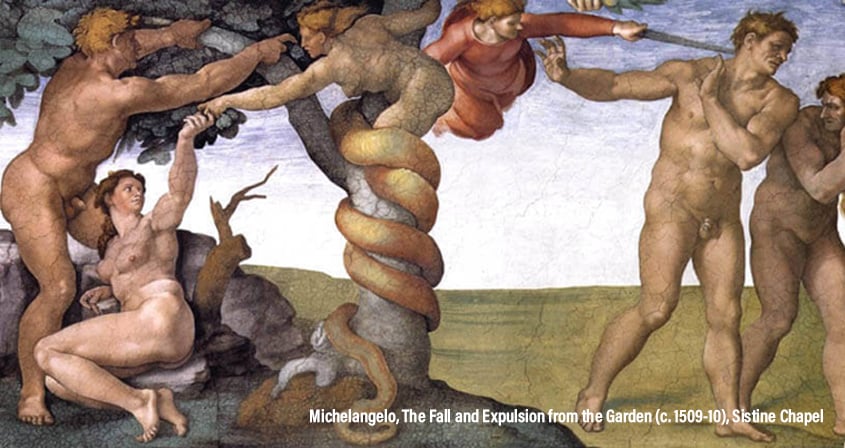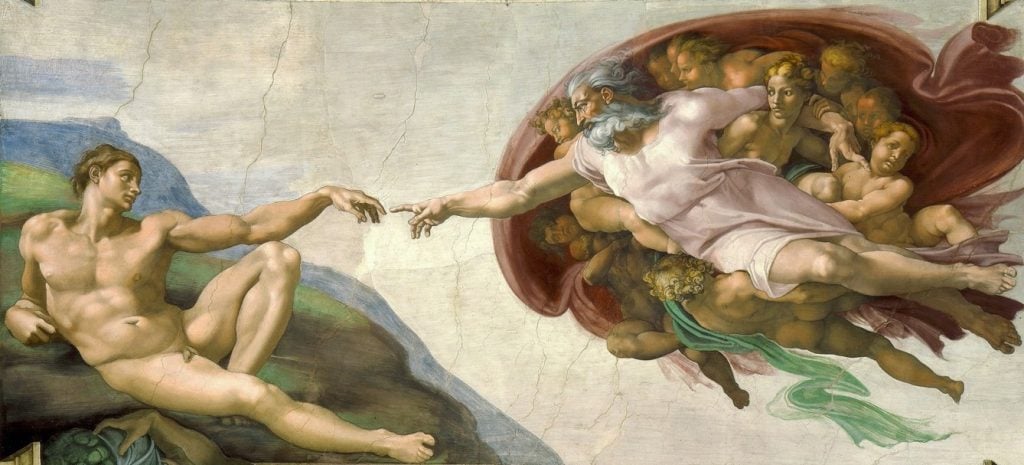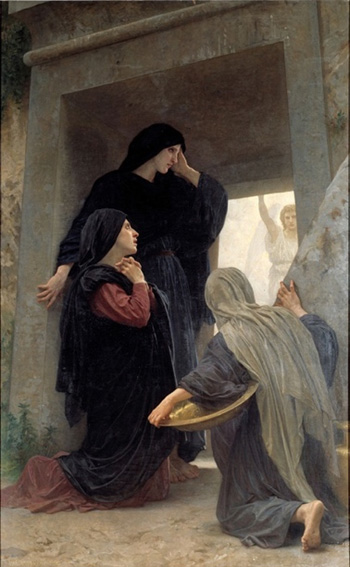CRISIS IN THE KINGDOM OF GOD: A THREE-PART HOMILY FOR THE TRIDUUM. III. CRISIS OF LOVE FOR HUMANITY

ST. MARY’S BASILICA, SYDNEY, 4 APRIL 2021

It’s the greatest story ever told: the story of God and man. Above all it’s a love story. God, as St Catherine of Siena put it, was pazzo d’amore, insane with love for us, from all eternity, even before we were made. He made us, in His own image, with Godlike reason, freedom, dominion, creativity and passion. He also made the cosmos for our sakes, for us to live and learn in, play and delight in, a universe in which to be lovers and beloved, God’s darlings. This same divine obsession holds us in being every moment of our existence.
When we love, with such creative, sustaining love, our hearts expand, our friendships deepen, our communion with God develops, the world is a better place. There’s something divine in every act of love, in vows of marriage or religion, in acts of care for family or friends, in good times spent together and hard times, in kindness to colleagues, strangers, the poor, even enemies.
It’s the greatest love-story ever told – and yet also a story of broken hearts. The crisis in the Kingdom of God, a crisis of all humanity, is that we turned against the very love that creates and sustains us. This fall from grace has been a recurrent pattern ever since, so that there’s nothing original about sin anymore. Recent campaigns have focused our attention on systemic racism and sexual violence. But pride, envy, lust, brutality and selfishness have dogged our history. Almost from the beginning there were elements of tragedy in this love story.
As human beings fell from grace they experienced a breakdown of relations with each other, God, creation, even themselves. This crisis of love is worse than ever today. Modernity treats loyalty as weakness, other people as rivals. We use each other for pleasure or profit, with no commitment, just a semblance of consent. Our love for creation can be equally ambiguous. Contemporary culture dismisses love of God as a childish fantasy sustained by a corrupt institution. Meanwhile self-regard easily becomes self-obsession, self-serving and eventually self-loathing.
In this crisis of love we are both victims and perpetrators. Each of us has hurt and been hurt. Each has loved not as well as we should and been loved not as well as we would. When we love well, we are at our most human and divine; but it costs, as God the Father saw when it cost Him his only Son.
So the greatest love-story ever told is also the greatest tragedy: the story of God holding out the hand of friendship since the dawn of time, and of humanity loving generously at times, not at all at others, middling so much of the time. God so loved us, He made us like Himself – and we rebelled against Him. God so loved us, He gave His only Son – and we hanged Him on a tree (Acts 10:34-43).
The Sacred Triduum plunges us into the Thursday crisis of the disciples, when they denied and fled, a crisis of faith for our Church. We are immersed in the Friday crisis of Jesus, when even He felt abandoned and we with Him, a crisis of hope. Finally, on this night, we are confronted with the crisis of all humanity: a crisis of love. Could God still love us when we had said No or Maybe so often? Could He when we said No so definitively that we killed His only Son? Could any love survive such unlove?
It’s the greatest romance, the greatest tragedy, but there is comedy here as well. In the Passion of St Mark that we heard last Sunday there was a cameo role for a young fellow – maybe Mark himself – who joined Christ in the garden with little more on than his boxer shorts(Mk 14:51-52). In the melee that followed he fled the scene leaving his garment in the soldiers’ hands. A moment of light relief, then, amidst the unremitting awfulness of the Passion story. But for the youth a moment of humiliation.

Today Mark tells us that on entering the tomb on Easter morning, the holy women didn’t see an angel or two, as in the other Gospel accounts. No, they “saw a young man dressed in a white robe and they were struck with amazement; but he said: ‘Don’t worry; Jesus has risen, He is not here.’” (Mk 16:1-7) Could this be the same young guy who only hours before was streaking away from the scene? Is this all humanity – lost and confused, sinful and sick, denuded of dignity and hope, in all the rawness of need – now dressed in glorious white, like the newly baptized?
“Fear not”, the young man says, “for love casts out fear. Go tell the lads Jesus is Risen. Tell Peter, who denied Christ three times, that he must now profess his love for Christ three times.” As angels lead the Church in heaven singing Holy, Holy, Holy, so the popes must lead the Church on earth singing Love, Love, Love. For Peter is humanity at last saying Yes where it’s so often said No. That affirmative love, tested in the crucible of denial and despair these three days past, is reborn today in the Resurrection of faith, hope and love. On them Christ will found His Church and so rebuild each one of us.
This is why Easter has always been the preferred time for Christian initiation: because it’s a celebration of new life in Christ. As we renew our baptismal vows today and are sprinkled anew with the waters of baptism, we recall St Paul’s words: in Baptism you have died with Christ, but one day you will rise with Him and be revealed in all your glory (Col 3:1-4). Easter says God loves each of us so much, He has woven the romance, tragedy and comedy of every human life together with His own story forever. God loves us so much, that whatever our own crises of faith, hope and love these can be faced, healed and transcended by His grace. Come out of the tomb with me, Jesus says to all humanity today, Rise up to everlasting life and love!
Word of Thanks following Celebration of Solemn Mass of the Sunday of the Resurrection
Dear friends: before our final blessing may I thank you all for joining me for this celebration of the holiest day of the year. It has been a truly beautiful Mass. For that I want to thank the Dean of St Mary’s Cathedral, Very Rev. Don Richardson, and the assistant priests of the Cathedral, the Precinct Manager Helen Morassut, the Sacristan Mr Chris Backhouse, our Master of Ceremonies Fr Lewi Barakat, our deacons and seminarians, acolytes and lectors, and our team of cathedral clergy and staff, ushers, bell-ringers and more. They’ve worked hard all Holy Week, preparing this Cathedral-church so beautifully, rehearsing the liturgical action, and then assisting at this Mass and many other ceremonies; and they do this, of course, not just in Holy Week but all year round. I am truly grateful and I know you all are also.
The news of Christ’s rising from the dead is the greatest news in history and deserves to be shouted from the rooftops and sung as an Alleluia chorus. Today two swallows have been flying around the ceiling of the cathedral chirping, as even the natural world wants to get in on the act of Alleluiaing. But we are especially grateful to our Director of Music, Mr Thomas Wilson, our organists, instrumentalists and choir: they have done splendidly yet again this year.
Finally, on behalf of all of us at St Mary’s Cathedral in Sydney a very Happy Easter to you and to all your loved ones, present physically or virtually. May God bless you abundantly in this holiest of seasons.

People of Sydney and beyond I bring you a message of great joy, the message of Alleluia. Χριστὸς ἀνέστη – Ἀληθῶς ἀνέστη! Christus resurrexit – Resurrexit vere! Christ is Risen – Truly, He is Risen!
Welcome to St Mary’s Cathedral in Sydney for the Solemn Mass of Easter Sunday. A year ago we were in lock-down and only the readers and other ministers were allowed in the cathedral with me. It is a great sign of our return to relative normalcy that we are able to welcome to our celebration Her Excellency the Governor of New South Wales, Hon. Margaret Beasley AC QC, and a basilica of Easter people – the maximum, in fact, allowed under COVID-safety laws. We give thanks that things are so much better now and that we were spared what many countries suffered this year past; and we continue to pray for the safety of our brothers and sisters overseas.
In preparation for the renewal of our Baptismal promises and to receive the plenary indulgence granted by the Roman Pontiff under the ordinary conditions to all who devoutly assist at this Mass, let us repent of our sins.

